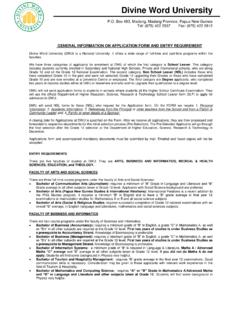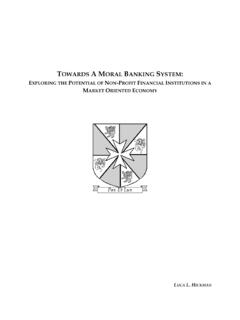Transcription of A History of Western Philosophy - Μουσική
1 A History of Western Philosophy Ralph McInerny Volume I Foreword / Acknowledgements Part I: Presocratic Philosophy o Chapter I: Before Philosophy A. The Quarrel Between Philosophy and Poetry B. The Theological Poets C. Greek Primitive Religion o Chapter II: The Ionians A. Thales of Miletus B. Anaximander of Miletus C. Anaximenes of Miletus D. Xenophanes E. Heraclitus of Ephesus o Chapter III: The Italians A. The Pythagoreans 1) Pythagoras of Samos 2) Pythagorean Doctrines B. Parmenides of Elea C. Zeno of Elea D. Melissus of Samos o Chapter IV: Empedocles of Acragas A. On Nature B. Purifications o Chapter V: Anaxagoras of Clazimenae o Chapter VI: Atomism Diogenes of Apollonia o Chapter VII: The Sophists A. Protagoras of Abdera B. Gorgias of Leontini C. Prodicus of Ceos D. Some Other Sophists E. Concluding Summary Part II: The Classical Period o Chapter I: Socrates A. His Life B.
2 The Character of Socrates C. The Doctrine of Socrates D. The Socratic Schools o Chapter II: Plato A. The Man and His Work B. The Doctrine of Forms C. The Crisis in Plato's Thought D. Plato's Natural Doctrine E. Plato's View of Man o Chapter III: Aristotle A. The Man and his Work B. The Nature and Division of Philosophy C. Aristotle's Logic D. Aristotle's Philosophy of Nature E. Moral and Political Philosophy F. First Philosophy Part III: The Hellenistic Period o Chapter I: Epicureanism A. Canonic B. Physics C. Ethics D. The History of the School o Chapter II: The Stoics A. Logic B. Physics C. Ethics D. The Roman Stoics o Chapter III: Sceptics and the New Academy A. Pyrrho of Elis B. Timon of Philus C. Arcesilaus D. Carneades of Cyrene E. Some Later Sceptics F. The Subsequent History of the Academy o Chapter IV: Neoplatonism A. Revival of Pythagoreanism. B. Plotinus C. After Plotinus Bibliography o Readings for Part One A.
3 Sources B. General Studies C. Particular Studies o Readings for Part Two A. Sources and Studies: Plato B. Sources and Studies: Aristotle o Readings for Part Three Index to Volume I Volume II Part I: The Age of Augustine o Chapter I: Faith and Philosophy o Chapter II: Saint Augustine A. The Man and His Work B. Philosophy and the Arts C. Philosophy and Beatitude D. Criticism of Platonism E. What Is Man? F. G o d G. Creation H. The City of God I. Conclusion o Chapter III: Denis the Areopagite o Chapter IV: Boethius A. The Man and His Work B. Faith and Reason C. Division of Philosophy D. The Status of Universals F. Plato or Aristotle? F. C o n c l u s i o n o Chapter V: Cassiodorus, Isadore, Bede Part II: The Carolingian Renaissance o Chapter I: Alcuin and Rhabanus Maurus A. Charlemagne and the Schools B. Alcuin (735-804) C. Fredegisus of Tours D. Rhabanus Maurus (784-856) E. The Carolingian Heritage o Chapter II: John Scotus Erigena A.
4 His Life and Works B. Faith and Philosophy C. The Division of Nature o Chapter III: Other Ninth and Tenth Century Figures A. Heiric of Auxerre ( - ) B. Remigius of Auxerre ( - ) C. Gerbert of Aurillac ( ) Part III: The Twelfth Century o Chapter I: Introduction o Chapter II: Saint Anselm of Canterbury A. The Man and His Work B. Faith and Reason C. The Proof of God's Existence D. Anselm and Dialectics o Chapter III: Peter Abelard A. The Man and His Work B. Abelard's Logic C. Faith and Reason D. Abelard's Ethics o Chapter IV: The School of Chartres A. From Fulbert to Bernard B. Gilbert of Poitiers (1076-1154) C. William of Conches ( - ) D. Thierry of Chartres (died before 1155) E. Clarenbald of Arras (died ) F. John of Salisbury (1110-1180) o Chapter V: Monastic Thought A. Hugh of St. Victor (1096-1141) B. Other Victorines C. Bernard of Clairvaux (1090-1153) D. Other Figures o Chapter VI: Dominicus Gundissilinus A.
5 What Is Philosophy ? B. The Division of Philosophy Part IV: The Thirteenth Century o Chapter I: The Background A. The Universities B. Translations C. Islamic Philosophy o Chapter II: The Beginnings A. William of Auvergne ( ) B. Alexander of Hales ( ) C. Robert Grosseteste (1175-1253) o Chapter III: Albert the Great A. The Man and His Work B. Faith and Reason C. Conclusion o Chapter IV: Roger Bacon A. His Life and Work B. The Opus majus C. Conclusion o Chapter V: Saint Bonaventure A. The Man and His Work B. The Nature of Philosophy C. Simultaneity of Knowledge and Belief D. Is Philosophy Autonomous? E. The Division of Philosophy F. The Divine Ideas C. The Nature of Illumination H. Proofs of God's Existence I. Creation and Universal Hylomorphism J. Conclusion o Chapter VI: Saint Thomas Aquinas A. The Man and His Work B. Philosophy and Theology C. The Division of Philosophy D. Log ic E.
6 Natural Philosophy F. M e t a p hy s i c s G. Moral Philosophy H. Thomas and His Time o Chapter VII: Conclusion Part V: The Fourteenth Century o Chapter I: Introduction o Chapter II: John Duns Scotus A. The Man and His Work B. Being and God C. Faith and Reason o Chapter III: William of Ockham A. The Man and His Work B. Knowledge C. Logic D. Metaphysics Index to Volume II Foreword This History of ancient Philosophy tries to give a comprehensive but wholly introductory sketch of a difficult and changing historical terrain. We are still learning about the beginnings of Philosophy and the scholarly contributions to our knowledge mount almost menacingly, intimidating one who would attempt an over-all simplified presentation. Writing a memo in anticipation of the Libyan battles, Churchill predicted that renown awaited the commander who would restore artillery to its proper place on the battle field: later he seemed as pleased with his phrasing of the claim as of its fulfillment.
7 Perhaps a relieved welcome, if not renown, awaits an introductory History which is not studded with the artillery of footnotes apprising the bewildered neophyte of esoteric studies on the fine points of recent scholarship in the period he is encountering for the first time. It is my feeling that there is little point in cluttering an introductory work with such references: the teacher does not need them and the student is not ready for them. Better unabashedly to popularize the period so as to make it as immediately and painlessly accesible as can honestly be done. The short reading lists at the back of the book will enable the interested reader to begin study in that scholarship on which such books as this are based. Of course, in the narrative, broad divergences of interpretation are mentioned and occasionally even adjudicated, but in every instance the attitude has been irenic and permissive. It is an Aristotelian axiom that we must begin any study with a confused view of the whole and this volume provides only a first step in the study of ancient Philosophy .
8 The present work was not conceived to fill some glaring gap in the works available for classroom use; there is a plethora of good histories of ancient Philosophy . This effort differs from some in the manner indicated in the preceding paragraph; it differs from others in being more brief; it differs from all, hopefully, in the style of its approach which may appeal to student and teacher alike. It is difficult to resist the impulse to put what one has learned into his own words even when what he knows is neither a private possession nor a personal discovery. In the course of teaching the History of ancient Philosophy at the University of Notre Dame, on campus as well as in Moreau Seminary, I amassed folders of notes, made sketches of chapters, had visions of a volume. When an opportunity came to prepare this book for Henry Regnery Company I was willing if not wholly ready to accept it. The result, being actual, seems almost a betrayal of the shimmering possibility I had cherished.
9 But that is often the way with actualities. I shall now let my imagination play on the possibility that this book will be of some aid to teacher and student in courses in the History of ancient Philosophy . That hope, at once modest and immense, is why it was written. Acknowledgements I would like to express my gratitude to the following publishers for their permission to quote copyrighted material: To the Clarendon Press, Oxford, for quotations from The Works of Aristotle Translated into English, 12 volumes, edited by W. D. Ross, 1905-1952, and from E. R. Dodds, Proclus' Elements of Theology, 1933; To Harvard University Press for quotations from the following volumes in the Loeb Classical Library: Diogenes Laertius' Lives of the Eminent Philosophers, 2 volumes, edited by R. D. Hicks, 1950; H. G. Evelyn-White, Hesiod, The Homeric Hymns and Homerica (1943); Sextus Empiricus, 4 volumes, edited by R. G. Bury, 1933-1949. To the Editors off the Encyclopedia Britannica for permission to quote from the MacKenna and Page translation of the Enneads of Plotinus which appears in Great Books of the Western World.
10 To Cambridge University Press for generous permission to quote from G. S. Kirk and J. E. Raven, The Presocratic Philosophers, Cambridge, 1957. To Basil Blackwell for permission to quote from Kathleen Freeman, Ancilla to the Presocratic Philosophers, Oxford, 1948. To Appleton-Century-Crofts for permission to quote from Selections from Hellenistic Philosophy by Gordon Clark, 1940. To Princeton University Press for permission to quote from Philip Wheelwright, Heraclitus, Princeton, 1959. To Columbia University Press for permission to quote from Anaximander and the Origins of Greek Cosmology by Charles H. Kahn, 1960. Unless otherwise indicated, all quotations from the dialogues of Plato are taken from the 19th century translation by Benjamin Jowett. Quotations from the letters of Plato are from the L. A. Post translation by permission of The Clarendon Press, Oxford. Volume I Part I: Presocratic Philosophy Chapter I Before Philosophy In presenting the History of Philosophy from its beginnings to Plotinus, we are assuming that Philosophy did indeed have a beginning and that it is possible to pass a more or less satisfactory judgment as to when this took place.








